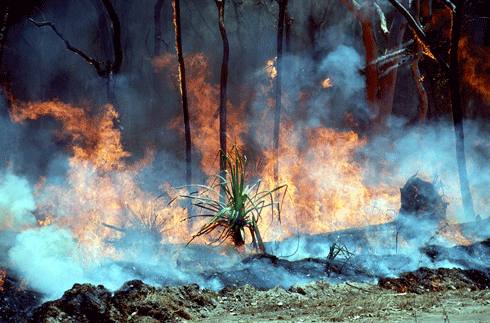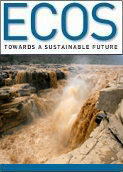
|
Published: 11 December 2012
Indigenous fire management ignites global interest
The Australian Government is working with the United Nations University (UNU) and the North Australian Indigenous Land and Sea Management Alliance Ltd (NAILSMA) to share Australia’s experience of savanna fire management mitigation projects with developing countries.

|
|
Controlled burning by Indigenous rangers in northern Australia reduces the incidence of large fires and thus higher greenhouse gas emissions. Credit:
scienceimage/CSIRO
|
‘Countries in Asia, sub-Saharan Africa and South America share similar savanna environments and traditional knowledge with regard to their management,' said Australia’s Parliamentary Secretary for Climate Change and Energy Efficiency, Mark Dreyfus, at a special briefing at the recent UN Climate Change Conference in Doha.
'As in Australia, in many cases traditional fire management practices have been interrupted, resulting in uncontrolled and destructive wild fires which emit large amounts of greenhouse gases.’
NAILSMA Chairman, Peter Yu, said: 'Indigenous land managers have been leading the development of the CFI methodology for savanna fire management in Australia.
Mr Yu explained there are two notable savanna fire management projects underway in north Australia: the award-winning West Arnhem Land Fire Management (WALFA) Project, and the Fish River Fire Project, which has recently been approved as a carbon emission offset project under the CFI. This means the project can generate carbon credits that can be sold into the Australian carbon market.
‘These projects have the potential to generate sustainable livelihoods in remote communities, where few other opportunities for earning an income exist,’ he said.
‘But more importantly, they strengthen ties to culture and country and provide an opportunity for Indigenous people to stay on their ancestral lands.’
Adding to the international dimension is the United Nations University’s Traditional Knowledge Initiative, which has worked with Indigenous people on climate change issues around the globe.
‘Australia’s approach to savanna fire management might be applicable in a number of developing countries,’ said senior research fellow of UNU’s Traditional Knowledge Initiative, Sam Johnston.
Using the knowledge and experience of Australia’s Indigenous land managers, the UNU will develop resources to document and communicate results and lessons learned and provide practical guidance on project design and implementation.
‘This is an exciting initiative that has the potential to extend [emissions] abatement opportunities to developing countries and raise ambition,’ said Mr Dreyfus.
‘It will allow interested groups around the world to benefit from the work done by Indigenous land managers in north Australia, assisting them to reduce emissions from savanna fires and generate sustainable income through participation in the global carbon market.’
Source: NAILSMA



